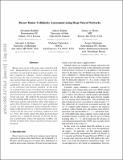| dc.contributor.author | Rakhlin, Alexander | |
| dc.contributor.author | Tiulpin, Aleksei | |
| dc.contributor.author | Shvets, Alexey A | |
| dc.contributor.author | Kalinin, Alexandr A | |
| dc.contributor.author | Iglovikov, Vladimir I | |
| dc.contributor.author | Nikolenko, Sergey | |
| dc.date.accessioned | 2021-12-03T14:40:32Z | |
| dc.date.available | 2021-12-03T14:40:32Z | |
| dc.date.issued | 2019 | |
| dc.identifier.uri | https://hdl.handle.net/1721.1/138304 | |
| dc.description.abstract | © 2019 IEEE. Breast cancer is one of the main causes of death worldwide. Histopathological cellularity assessment of residual tumors in post-surgical tissues is used to analyze a tumor's response to a therapy. Correct cellularity assessment increases the chances of getting an appropriate treatment and facilitates the patient's survival. In current clinical practice, tumor cellularity is manually estimated by pathologists; this process is tedious and prone to errors or low agreement rates between assessors. In this work, we evaluated three strong novel Deep Learning-based approaches for automatic assessment of tumor cellularity from post-treated breast surgical specimens stained with hematoxylin and eosin. We validated the proposed methods on the BreastPathQ SPIE challenge dataset that consisted of 2395 image patches selected from whole slide images acquired from 64 patients. Compared to expert pathologist scoring, our best performing method yielded the Cohen's kappa coefficient of 0.69 (vs. 0.42 previously known in literature) and the intra-class correlation coefficient of 0.89 (vs. 0.83). Our results suggest that Deep Learning-based methods have a significant potential to alleviate the burden on pathologists, enhance the diagnostic workflow, and, thereby, facilitate better clinical outcomes in breast cancer treatment. | en_US |
| dc.language.iso | en | |
| dc.publisher | IEEE | en_US |
| dc.relation.isversionof | 10.1109/ICCVW.2019.00048 | en_US |
| dc.rights | Creative Commons Attribution-Noncommercial-Share Alike | en_US |
| dc.rights.uri | http://creativecommons.org/licenses/by-nc-sa/4.0/ | en_US |
| dc.source | arXiv | en_US |
| dc.title | Breast Tumor Cellularity Assessment Using Deep Neural Networks | en_US |
| dc.type | Article | en_US |
| dc.identifier.citation | Rakhlin, Alexander, Tiulpin, Aleksei, Shvets, Alexey A, Kalinin, Alexandr A, Iglovikov, Vladimir I et al. 2019. "Breast Tumor Cellularity Assessment Using Deep Neural Networks." Proceedings - 2019 International Conference on Computer Vision Workshop, ICCVW 2019. | |
| dc.contributor.department | Massachusetts Institute of Technology. Institute for Medical Engineering & Science | |
| dc.relation.journal | Proceedings - 2019 International Conference on Computer Vision Workshop, ICCVW 2019 | en_US |
| dc.eprint.version | Original manuscript | en_US |
| dc.type.uri | http://purl.org/eprint/type/ConferencePaper | en_US |
| eprint.status | http://purl.org/eprint/status/NonPeerReviewed | en_US |
| dc.date.updated | 2021-12-03T14:35:24Z | |
| dspace.orderedauthors | Rakhlin, A; Tiulpin, A; Shvets, AA; Kalinin, AA; Iglovikov, VI; Nikolenko, S | en_US |
| dspace.date.submission | 2021-12-03T14:35:26Z | |
| mit.license | OPEN_ACCESS_POLICY | |
| mit.metadata.status | Authority Work and Publication Information Needed | en_US |
